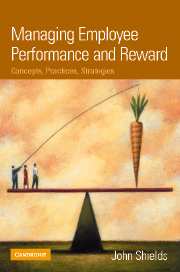Book contents
- Frontmatter
- Contents
- List of figures and tables
- Foreword by John Egan
- Acknowledgements
- Introduction: Setting the scene
- Part 1 The fundamentals
- 1 Performance and reward basics
- 2 Working with psychology
- 3 Managing motivation
- 4 Being strategic and getting fit
- Part 2 Performance management in action
- Part 3 Base pay and benefits
- Part 4 Rewarding employee performance
- Part 5 Fitting it all together
- Model responses to case studies
- References
- Index
3 - Managing motivation
from Part 1 - The fundamentals
- Frontmatter
- Contents
- List of figures and tables
- Foreword by John Egan
- Acknowledgements
- Introduction: Setting the scene
- Part 1 The fundamentals
- 1 Performance and reward basics
- 2 Working with psychology
- 3 Managing motivation
- 4 Being strategic and getting fit
- Part 2 Performance management in action
- Part 3 Base pay and benefits
- Part 4 Rewarding employee performance
- Part 5 Fitting it all together
- Model responses to case studies
- References
- Index
Summary
In chapter 2, we examined some of the possible associations between work attitudes, including task motivation, and work behaviour, including work effort or task behaviour. One of the key messages of that discussion was that work attitudes do not arise randomly or accidentally, nor are they a simple reflex of employee personality traits. This is good news for people managers since it means that it is to some degree possible to manage and, where necessary, to alter attitudinal states. We also noted the importance of the employee psychological contract and justice perceptions as crucial mediating influences between human resource practices and employee attitudes and behaviour. These are also useful conceptual devices for better understanding and perhaps influencing employee attitudes, perceptions and behaviour in a way that is beneficial to both the organisation and the employees themselves.
Of the attitudes considered in chapter 2, that which is generally accorded greatest importance as a determinant of employee performance is work (or task) motivation. In this chapter we examine the matter of motivation in greater detail. As we shall see, for all of its importance, and despite its being one of the most closely researched topics in the social sciences, the sources of task motivation remain a matter of longstanding and continuing debate in Western management thought. The chapter begins by reiterating the definition of motivation given in chapter 2.
- Type
- Chapter
- Information
- Managing Employee Performance and RewardConcepts, Practices, Strategies, pp. 65 - 87Publisher: Cambridge University PressPrint publication year: 2007



